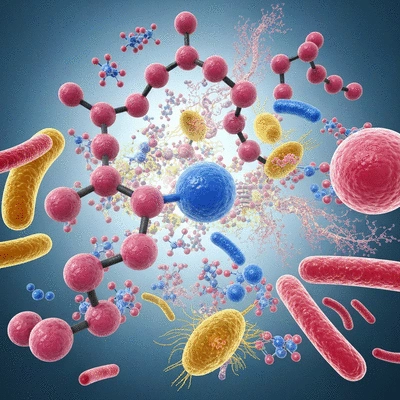Have you ever felt a knot in your stomach during a stressful situation? This common experience highlights the profound connection between our mind and digestive health. Understanding how stress impacts our gut can empower you to take control of your well-being.
What You Will Learn
- How the body's fight-or-flight response can disrupt digestion, leading to symptoms like bloating and cramping.
- The role of stress hormones, such as cortisol, in exacerbating digestive issues and altering gut function.
- Common stress-induced digestive symptoms, including diarrhea, constipation, and abdominal pain.
- The importance of managing chronic stress to alleviate symptoms of gastrointestinal disorders like IBS.
- Practical steps to reduce stress, such as incorporating mindfulness practices and maintaining a balanced diet.
The Stress-Digestion Connection: A Visual Summary
This visual highlights the key physiological mechanisms and symptoms that link stress to digestive health, emphasizing the brain-gut axis and the role of cortisol.
Physiological Mechanisms of Stress on Digestion
- Slowed digestion
- Increased gut sensitivity
- Altered gut motility
- "Leaky gut" (increased permeability)
Key Players: Brain-Gut Axis & Cortisol
The Brain-Gut Axis: Two-way communication disrupted by stress.
Cortisol (Stress Hormone) leads to:
- Increased stomach acidity
- Reduced blood flow to gut
- Altered gut microbiome
Common Stress-Induced Digestive Symptoms
- Diarrhea
- Constipation
- Abdominal pain/cramping
- Flare-ups of IBS & functional dyspepsia
Steps Towards Better Digestive Health
- Relaxation routine
- Mindfulness (meditation, yoga)
- Food & stress journal
- Hydration & balanced diet
Understanding the Connection Between Stress and Digestion
Stress is something we all experience, but did you know it can have a profound effect on your digestive health? When we face stress, our bodies activate the fight-or-flight response, which can disrupt normal digestive processes. This disruption can lead to symptoms like bloating, cramping, and even slowed digestion. Understanding this connection helps us take proactive steps to manage stress and support our digestive health.

From my experience as a gastroenterologist, I often see patients who are unaware of how stress impacts their gut. By learning how stress affects digestion, we can become better equipped to alleviate discomfort and improve our overall well-being. Let's dive deeper into the physiological mechanisms at play!
How Stress Upsets Your Gut: Physiological Mechanisms
When we encounter stress, our body releases hormones like adrenaline and cortisol. These hormones prepare us to respond to danger but also have effects on our digestive system. Let’s look at how this happens:
- Slowed digestion: As blood flow is redirected to essential organs, the digestive tract may slow down, causing discomfort.
- Increased sensitivity: Stress can heighten sensitivity in the gut, leading to sensations of pain or cramping.
- Altered gut motility: Stress can lead to changes in how quickly food moves through the digestive system, resulting in symptoms like diarrhea or constipation.
These physiological changes highlight the importance of managing stress for maintaining a healthy digestive system. Recognizing these symptoms is the first step toward effective management.
The Role of the Brain-Gut Axis in Digestive Health
Have you ever experienced a knot in your stomach during a stressful moment? That’s not just a figure of speech! The brain-gut axis describes the two-way communication between the brain and the gut. When stress hits, this communication can become disrupted, affecting digestion.
Research shows that stress can increase gut permeability, sometimes referred to as "leaky gut," which allows toxins to enter the bloodstream. This can lead to inflammation and exacerbate existing digestive issues. Understanding this connection empowers us to approach our digestive health holistically. By managing stress, we can positively influence our gut health!
Identifying Stress-Induced Digestive Symptoms
Now that we’ve explored the connection between stress and digestion, let’s identify the common symptoms that may arise when stress takes a toll on our digestive health.
Common Digestive Issues Linked to Stress
Many people may not realize that their digestive troubles are linked to stress. Here are some prevalent symptoms:
- Diarrhea: Sudden, urgent bathroom trips can be a direct response to stress.
- Constipation: Conversely, stress can also cause a slowdown in digestion, leading to constipation.
- Abdominal pain: You may experience cramps or discomfort in your stomach area, often triggered by anxiety.
Recognizing these symptoms can help you understand your body better and seek appropriate management strategies. If you relate to any of these, it’s time to explore ways to mitigate stress!
The Impact of Chronic Stress on Gastrointestinal Disorders
Ongoing stress doesn’t just lead to temporary discomfort; it can significantly impact chronic conditions like irritable bowel syndrome (IBS) and functional dyspepsia. For instance, stress can trigger flare-ups of IBS, leading to painful symptoms that disrupt daily life.
Addressing stress is crucial for managing these disorders effectively. Incorporating relaxation techniques and dietary changes can create a more stable digestive environment. Remember, it is essential to address both your mental and physical health for comprehensive care!
The Role of Cortisol in Digestive Health
Cortisol, often referred to as the "stress hormone," plays a significant role in digestion. Elevated levels of cortisol can lead to:
- Increased acidity: High cortisol levels can produce more stomach acid, leading to heartburn or acid reflux.
- Reduced blood flow: This can slow digestion and cause various gastrointestinal symptoms.
- Altered gut microbiome: Stress-induced cortisol can disrupt the balance of healthy bacteria in your gut.

Understanding how cortisol affects your digestive health is crucial. By managing stress through lifestyle changes, you can help regulate cortisol levels and support your gut function!
Pro Tip
To effectively manage stress and support your digestive health, consider incorporating mindfulness techniques such as deep breathing or progressive muscle relaxation. These practices can help reduce cortisol levels and promote better digestion. Make it a habit to dedicate just a few minutes each day to unwind and focus on your breath!
Frequently Asked Questions About Stress and Digestion
Q1: How does stress directly impact digestion?
Stress activates the body's "fight-or-flight" response, which diverts blood flow away from the digestive system. This can lead to slowed digestion, increased gut sensitivity, and altered gut motility, causing symptoms like bloating, cramping, diarrhea, or constipation.
Q2: What is the brain-gut axis and how does stress affect it?
The brain-gut axis is a two-way communication system between the brain and the gut. Stress can disrupt this communication, affecting gut function and potentially leading to increased gut permeability (sometimes called "leaky gut"), which allows toxins into the bloodstream and can exacerbate inflammation.
Q3: Can stress cause or worsen chronic digestive conditions like IBS?
Yes, chronic stress can significantly impact and worsen conditions such as Irritable Bowel Syndrome (IBS) and functional dyspepsia. Stress can trigger flare-ups, leading to increased pain and discomfort for individuals with these disorders.
Q4: What role does cortisol play in stress-induced digestive issues?
Cortisol, the primary stress hormone, can lead to several digestive problems. Elevated cortisol levels can increase stomach acidity, reduce blood flow to the digestive tract, and alter the balance of the gut microbiome, all contributing to digestive discomfort.
Q5: What are some practical steps to manage stress for better digestive health?
Practical steps include incorporating relaxation routines, practicing mindfulness (meditation, yoga), keeping a food and stress journal to identify triggers, staying hydrated, and maintaining a balanced, fiber-rich diet. Utilizing stress tracking apps, dietary guides, and relaxation technique resources can also be beneficial.
Summarizing the Importance of Stress Management for Digestive Health
Understanding the intricate relationship between stress and digestion is crucial for anyone struggling with gastrointestinal issues. As we explored in our previous sections, stress can trigger a variety of digestive disruptions, from bloating to more severe conditions like IBS. By recognizing both the physiological and psychological aspects of this connection, we can take proactive steps towards better health.
Remember, stress isn’t just a mental burden; it physically impacts our gut health. The University of Western States blog emphasizes the link between stress, digestion, and the microbiome, illustrating how psychological pressure can alter gut bacteria and overall function. Awareness of this relationship can empower you to address your digestive issues with targeted strategies.
Taking Action: Steps Towards Better Digestive Health
Now that we understand the connection between stress and digestion, it's time to implement some practical strategies into our daily lives. Start small and gradually incorporate these techniques to help manage stress and improve your digestive health. Here are a few steps you can take:
- Create a daily routine that includes time for relaxation.
- Incorporate mindfulness practices such as meditation or yoga.
- Keep a food and stress journal to identify triggers.
- Stay hydrated and maintain a balanced diet rich in fiber.
By making these adjustments, you can significantly impact your overall well-being. Let's dive deeper into some helpful resources that can support you on this journey.
Resources and Tools for Stress Management
To assist you in managing stress effectively, consider utilizing these resources:
- Stress Tracking Apps – Keep an eye on your stress levels throughout the day.
- Dietary Guides – Find tips on nutrition that can alleviate stress.
- Relaxation Techniques – Explore various methods for calming the mind and body.
These tools can help you stay on track and provide support as you work towards improved digestive health. Furthermore, research published in PMC (PubMed Central) offers detailed insights into the mechanisms by which stress affects the gastrointestinal system, providing a scientific basis for these management strategies.
Join the Conversation
I invite you to share your experiences with managing stress and its impact on your digestive health. How have you tackled stress in your daily life? Your stories can inspire others in our community who might be facing similar challenges!
Exploring Support Groups and Community Resources
Don’t forget the power of community in your health journey. Joining support groups can connect you with others who understand your struggles with stress and digestion. These connections can provide invaluable emotional support and practical tips to help you navigate your path to wellness.
Whether through local meet-ups or online forums, engaging with others can foster a sense of camaraderie and shared purpose. Let's take these steps together and empower ourselves towards healthier digestion!
Recap of Key Points
Here is a quick recap of the important points discussed in the article:
- Stress affects digestion: The fight-or-flight response can disrupt normal digestive processes, leading to symptoms like bloating and cramping.
- Physiological mechanisms: Stress hormones such as cortisol can slow digestion, increase gut sensitivity, and alter gut motility.
- Brain-gut axis: Stress can disrupt communication between the brain and gut, potentially leading to issues like "leaky gut."
- Common symptoms: Stress can manifest in digestive problems, including diarrhea, constipation, and abdominal pain.
- Chronic stress impact: Ongoing stress can exacerbate conditions like IBS, making stress management essential for digestive health.
- Cortisol's role: Elevated cortisol levels can increase stomach acidity and disrupt gut microbiome balance.
- Actionable steps: Incorporate relaxation techniques, maintain a balanced diet, and keep a stress journal to manage stress effectively.









